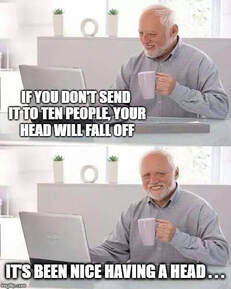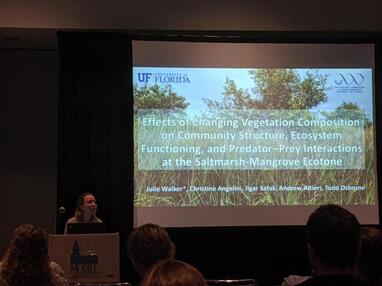|
Author: Julie Walker *Just warning you this blog post is basically just an advertisement for you to read my recently published paper. Now, I am very convincing and if you read this blog you will end up reading my paper, so if you would prefer to save some time and skip right to the good stuff you can go ahead and start reading here (that's right its open access baby). If you want to read some more of my rambling, before reading some of my scientific rambling, then by all means enjoy the next few paragraphs! * Phew. Writing can be hard when you aren't just making a bunch of corny puns and dad jokes ( if you haven't noticed yet I enjoy very high brow humor). But after several months of writing, editing, graphing, analyzing, I finally have a genuine published scientific article! It has definitely been quite the learning process getting to this point. You would think after read all of these academic journals writing one would be a breeze, which maybe it is for some people, but because my list of god given natural talents is very limited to mostly useless skills like being pretty decent a flip cup (which was a much bigger asset to me in undergrad than it has been in graduate school) it was a bit of a challenge. Without giving away too much of the punchline from my paper, one of the challenges was forming a story around insignificant results. No one warned me that when your perfectly valid hypothesis derived from scouring the literature for hours is rejected, you have to factor in quite a bit of "what f**k does this mean" time into writing. Nor was I warned that insignificant results aren't quite "sexy" enough for mainstream journals. However, after undertaking the challenge of getting a paper published that had very little in the way of statistical significance- I think I my work still has a lot of scientific significance. So as a newly published author here are my words of wisdom. I have heard many people referring to insignificant findings as a "failed experiment", this my friend is a toxic way of thinking. Just because the relationship, or mechanism, or whatever you hypothesized was happening isn't happening, does mean mean you failed. You have still added to the body knowledge. Sometimes insignificance is just as significant when looking at an ecological system. Sure writing a paper about how species A does give a hoot about whatever the heck Species B is doing is a little harder to write a compelling story around... but isn't it still important to know? If I was in charge of managing species A, I sure would want to know. By publishing your results you have narrowed the field of possibilities, allowing yourself and others to focus precious time and resources on other avenues. So kick the norm, publish your "failed experiments", and the significance of your contribution will be way < 0.05, I promise. Anyhow... long story short.... read my paper and forward it to 10 friends or something really bad will happen... I mean, I'm not saying your head will fall off.... but is it really worth the risk? Told you I was convincing.
Read it here! Abstract teaser (if your head falling off isn't convincing enough) Decreasing frequency of freeze events due to climate change is enabling the poleward range expansion of mangroves. As these tropical trees expand poleward, they are replacing herbaceous saltmarsh vegetation. Mangroves and saltmarsh vegetation are ecosystem engineers that are typically viewed as having similar ecosystem functions. However, few studies have investigated whether predation regimes, community structure, and ecosystem functions are shifting at the saltmarsh-mangrove ecotone. In this study, we manipulated predator access to marsh and mangrove creekside habitats to test their role in mediating vegetation and invertebrate structure and stability in a two-year experiment. We also conducted a survey to evaluate how shifting vegetation is modifying structural complexity, invertebrate communities, and ecosystem functioning at the ecotone. Excluding larger (> 2 cm diameter) predators did not affect vegetation or invertebrate structure or stability in either saltmarsh or mangrove habitats. The survey revealed that the two habitat types consistently differ in structural metrics, including vegetation height, inter-stem distance, and density, yet they support similar invertebrate and algal communities, soil properties, and predation rates. We conclude that although mangrove range expansion immediately modifies habitat structural properties, it is not altering larger predator consumptive effects, community stability, community composition, or some other ecosystem functions and properties at the ecotone.
1 Comment
Author: Julie Walker Me presenting at my first national conference, CERF (Coastal and Estuarine Research Federation) I don't know about you all, but I have always had a love hate relationship with public speaking. On one hand one of my favorite things about science is getting making it accessible through communicating it in the form of an interesting story. The feeling of validation you get when you convince someone to be genuinely interested in your work doesn't suck either. Yet on the other hand the thought of talking to someone on the phone none the less to a crowded room of people makes me want to vomit. If you struggle like I do to manage being a good science communicator and your anxiety at the same- here are some tricks I have learned that might just be helpful to you.
*Full disclaimer: I am not an expert in public speaking and I the thought of public speaking still makes me feel like I drank a gallon of coffee- but this has made it a little bit easier* 1. Start small If possible, try and make you first talk to the smallest friendliest crowd possible. Check to see if your department or professional society has smaller meetings for graduate students or local chapter meetings that you can present at. Keeping the stakes low will help you focus not on the stress of a large room and more on just working on your presentation skills. 2. Make it idiot proof When you are developing your presentation try and make it as easy as possible to follow - for both your audience and yourself when you have frazzled stress brain. How do you do this? Keep only the information that is absolutely necessary to get you point across on the screen. Anything else will distract your audience, or might steer your to ramble about a tangent for the entirety of your allotted time. Having a cue word or graphic to come across the screen to remind yourself to emphasize an important point is also a good tactic if you are afraid that you might forget it in the stress of the moment. 3. Practice, Practice, Practice This one is probably the biggest "duh..." of all but "practice makes perfect" is a cliche for a reason. But once you have your presentation made practice, practice, practice. I have subjected my SO, my labmates, blank walls, and even my dog to my stuttered rambling. The biggest tip I can give is even if you don't want to memorize a script for your presentation, at least memorize the transitions, this will help make you presentation flow and keep you from being surprised by the next slide. 4. Pick a friendly face Find someone who looks like they ate rainbows for breakfast, and have birds dress them every morning. That's who you are giving this talk too. You don't need any passive scowlers in your life, good vibes only. The more engaged the person seems the more relax you will be. However- no matter how many rainbow someone eats, they may still get freaked out if you stare them down the entire time, so maybe pick a couple smilers and bounce between them- better yet pick a friend to be a ringer to plant in the audience and stare as much as you want. 5. Imagine everyone in the room doesn't hate you they are probably just tired My biggest fear when public speaking is that everyone in the room is judging my work, my speaking ability, and my appearance. However, from being an audience member in many talks, most people aren't busy sitting around judging other people they are just trying to stay awake after a long day of sitting in a crowded conference room and making small talk with peers. So instead of fixating on what other people are thinking- fixate on making them not bored. If you manage to make your talk so engaging that it distracts them from checking their email for 15 minutes, you have done your job as an effective science communicator. 6. Practice, Practice, Practice again Once you have your talk done, why not take it out for a spin once and a while? The more times you give the same presentation the easier it will be. Without the stress of making the presentation and figuring out exactly what you are going to say, you may be able to reduce your stress from several days before a presentation to maybe just a couple hours or maybe even a couple minutes if your lucky. Well that's about all the tips I have- if you happen to have any more for improving presentation skills- leave them in the comments! |
Fellows BlogLearn about a day in the life of our Fellows, from the field to the classroom as they compete their journey through graduate school. Archives
January 2020
Categories |


 RSS Feed
RSS Feed
